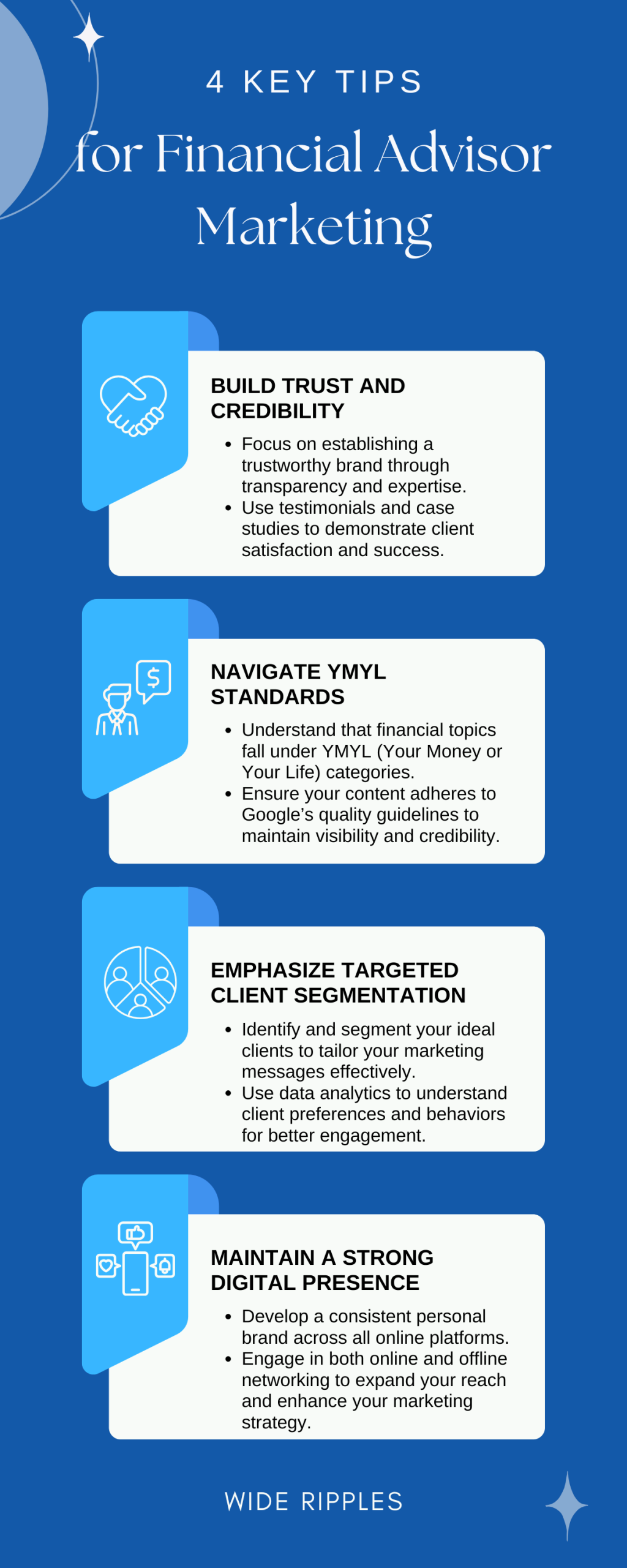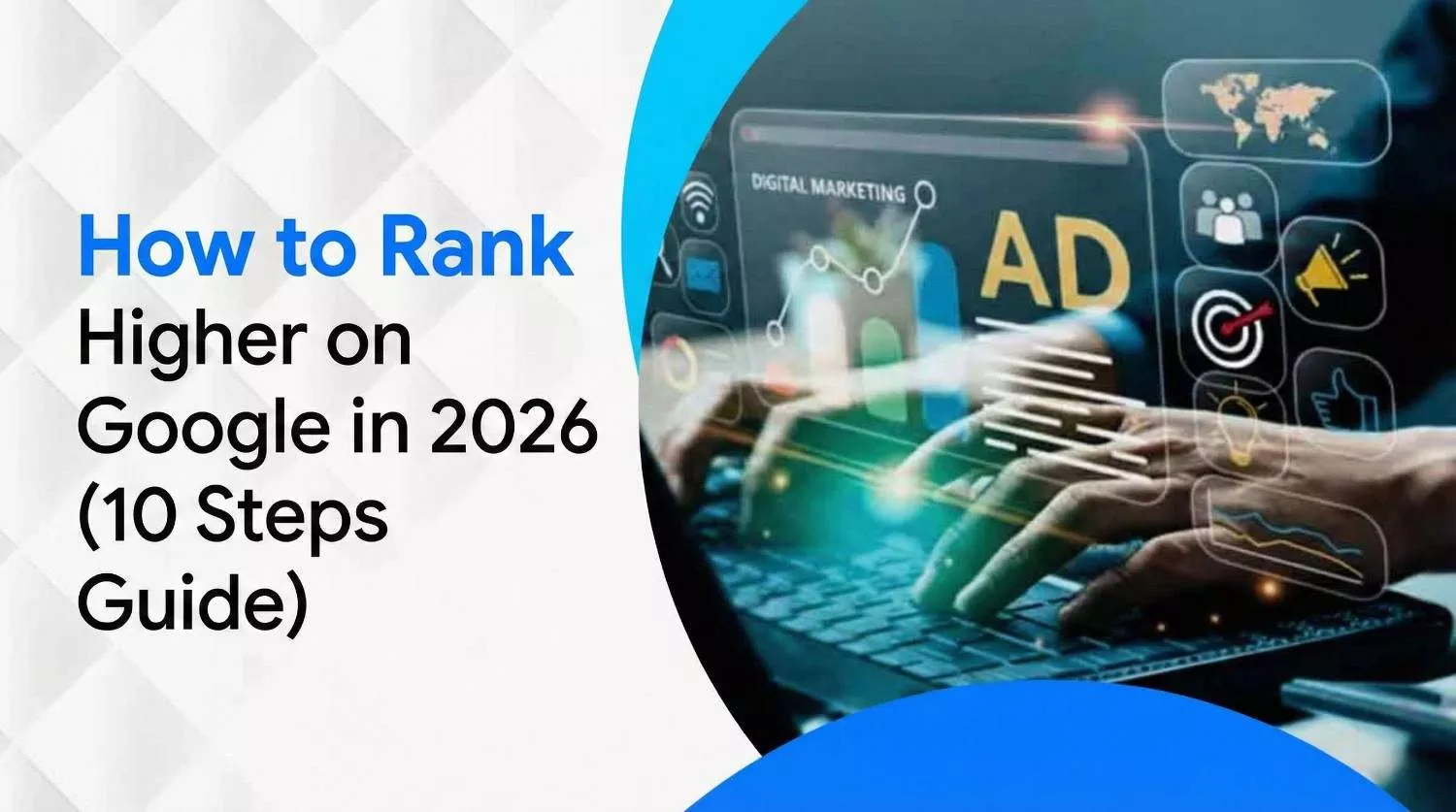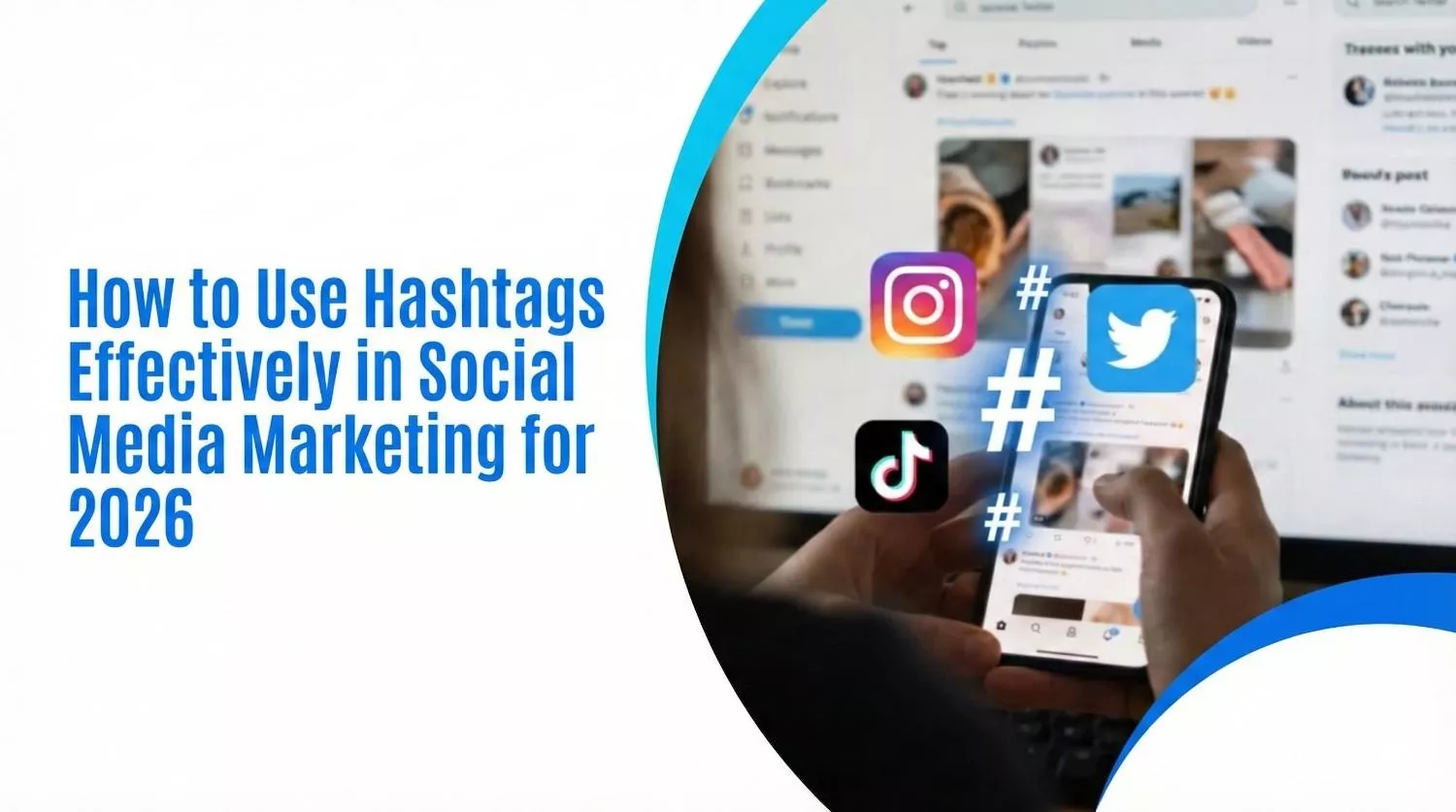
Digital Marketing For Financial Advisors: 7 Proven Strategies
January 6, 2025
| Sheraz Khan | Reviewed by Haseeb
- What is Digital Marketing For Financial Advisors?
- Digital Marketing vs. Traditional Marketing
- How To Get Started?
- Proven Digital Marketing Tips for Financial Advisors: A Step-by-Step Guide
- 1. Branding: Make Your Mark
- 2. Content Marketing: Educate and Engage
- 3. Social Media Marketing: Build Relationships
- 4. Email Marketing: Stay Connected
- 5. Podcasts: Share Your Expertise
- 6. Blogging: Go Deep and Build Authority
- 7. Digital Advertising: Target Your Ideal Clients
- Ready to Grow? Start Your Digital Marketing Plan Today!
- FAQs
- What is the importance of digital marketing for financial advisors?
- How can financial advisors create an effective digital marketing strategy?
- What are the best digital marketing channels for financial advisors?
- How can financial advisors generate leads through digital marketing?
- What are the most cost-effective digital marketing strategies for financial advisors?
- How does SEO benefit financial advisors in digital marketing?
- What social media platforms should financial advisors use for digital marketing?
- How can content marketing help financial advisors grow their business?
- What role does email marketing play in a financial advisor’s digital marketing plan?
- How can financial advisors measure the success of their digital marketing campaigns?
Now is the perfect time to dive into digital marketing for financial advisors. In today’s world, it’s not just a nice-to-have, but a must-have!
Whether you’re active online or not, your target audience is already there, researching financial advisors just like you. The power of digital marketing ensures you’re showing up exactly when and where your future clients need you.
Digital marketing for financial advisors allows you to present yourself authentically and professionally, making sure that your presence catches the attention of potential clients.
In fact, your digital presence could be the deciding factor in whether or not you receive that client call. The great news? It doesn’t have to consume all your time or feel overwhelming.
With 49% of financial services professionals identifying content marketing as the most effective digital marketing strategy, and 72% seeing social media as key for engagement, it’s clear that online visibility is essential.
Add to that, 71% of financial marketers find SEO crucial for acquiring new clients, and 40% of consumers base their choice of financial advisor on the quality of their digital experience. The numbers speak for themselves!
What is Digital Marketing For Financial Advisors?
Think about the last time you wanted to try a new restaurant. What did you do first? Most likely, you went online to read reviews, browse the menu, and maybe even book a reservation.
The same logic applies to potential clients searching for financial advisors.
People want to quickly assess your value, understand your services, and see how you can help them solve their financial challenges.
Digital marketing strategy for financial advisors encompasses everything from your website and social media presence to informative videos and blog content.
By defining your target audience and addressing their specific financial pain points, you create a personalized experience that builds trust.
You don’t just want to be found online; you want to become a go-to source of reliable financial information, ultimately making your advisory services stand out.

Digital Marketing vs. Traditional Marketing
Digital marketing for financial advisors has revolutionized the way advisors connect with potential clients.
Unlike traditional marketing methods such as cold calling or in-person networking, digital marketing allows advisors to create a dynamic online presence through websites, social media, and other platforms.
This shift has made it easier to attract clients without the time-intensive effort of contacting prospects one by one.
Traditional methods like cold calling often feel outdated, especially in today’s world where the pandemic accelerated a shift toward virtual networking.
Digital marketing gives financial advisors the ability to reach a much broader audience with significantly less time investment.
Moreover, by utilizing a digital marketing strategy for financial advisors, you can track performance in real-time and make data-driven adjustments to enhance results.
It’s not just about visibility—it’s about working smarter, not harder.
Benefits of Digital Marketing for Financial Advisors
Digital marketing for financial advisors offers numerous advantages, beginning with the ability to gather valuable insights about your prospects.
By analyzing client behaviors and preferences online, you can better understand what they seek in an advisor. This allows you to tailor your approach and speak directly to their financial needs.
In addition, digital marketing creates a comfortable environment for both prospects and existing clients to engage with your brand. It enhances brand awareness and increases the likelihood of conversions, all while building long-term client loyalty.
The best digital marketing strategies for financial advisors allow you to showcase what sets your business apart, helping you stand out in a competitive market.
By connecting authentically and meaningfully with your audience, you establish trust and position yourself as a trusted financial expert.
How To Get Started?
To kickstart your digital marketing for financial advisors, the first step is to develop a clear digital marketing strategy. This doesn’t need to be overly complicated, but it must answer two critical questions:
Who is your target audience? and What are your goals?
For instance, if you aim to attract Gen-Z investors, you’ll want to focus on social media platforms like Instagram or TikTok.
However, if your target market includes retirees, then creating valuable content around retirement planning may be more effective.
Crafting a solid digital marketing strategy for financial advisors ensures that your time and resources are spent wisely, yielding measurable results.
Once your strategy is in place, you can branch out to different channels. Email remains a tried-and-true method that reaches a large audience and delivers a high return on investment. Social media platforms may come and go, but email remains constant. Building a robust email list is key, allowing you to share your expertise directly with prospects and clients.
From sharing blogs to offering eBooks or tutorials, email marketing keeps you in touch with clients in a personal way that leads to trust and, ultimately, conversions.
Crafting Content That Resonates With Your Audience
When it comes to creating engaging content, one of the top digital marketing tips for financial advisors is to focus on what your audience needs rather than what you want to promote.
Educational content is far more impactful than promotional material because it addresses real concerns your target audience is facing.
Whether it’s a video, infographic, or an article, make sure the content you produce is insightful and relevant.
Offering solutions builds trust and positions you as an expert. For example, creating a video about college funding that includes a personal story can help forge an emotional connection with your audience.
| Digital Marketing Tips for Financial Advisors | Key Actions |
| Focus on Audience Needs | Create educational content that addresses real concerns of your target audiencePrioritize insightfulness and relevance over promotional materialOffer solutions to build trust and position yourself as an expert |
| Use Emotional Storytelling | Create content like videos, infographics, or articles with personal storiesForge emotional connections by addressing relatable issues (e.g., college funding) |
| Update Content Regularly | Keep content fresh to retain client interest and improve Google rankings |
| Leverage AI for Automation | Automate content curation, post scheduling, and email campaigns using AI toolsLighten the load while ensuring consistent marketing efforts |
Another vital tip is to regularly update your content.
Keeping it fresh ensures clients keep coming back for more, and it also signals to search engines like Google that your website is active, which improves your ranking.
One of the best digital marketing strategies for financial advisors is to automate your marketing tasks using AI tools.
These tools can help you curate content, schedule posts, and send out automated emails, lightening the load and ensuring your digital marketing ideas for financial advisors continue to produce results even when you’re busy handling client portfolios.
Thought Leadership for Financial Advisors
Establishing thought leadership is one of the most powerful digital marketing strategies for financial advisors.
It’s not just about showcasing your expertise—it’s about building credibility, trust, and long-term relationships with your audience.
Becoming a thought leader takes time, deep industry knowledge, and a consistent commitment to sharing valuable insights. However, the payoff in terms of authenticity and brand awareness is immense.
But here’s the good news: you don’t have to do it all alone.
Just like influencer marketing, financial advisors can collaborate with established thought leaders to amplify their message.
For example, James Eagle, an investment writer and founder of Eeagli, regularly shares insightful charts and infographics on platforms like LinkedIn and X, providing value to his followers.

By aligning yourself with thought leaders like him or becoming one yourself, you can take your digital marketing for financial advisors to the next level, driving engagement and increasing visibility within your target market.
Proven Digital Marketing Tips for Financial Advisors: A Step-by-Step Guide
1. Branding: Make Your Mark
Branding is the foundation of digital marketing for financial advisors. It’s about making it clear why clients should choose you over competitors like robo-advisors or large firms.
What sets you apart?
Highlight your experience, niche market, and credentials. Whether it’s tax planning, retirement strategies, or estate management, your branding needs to communicate the unique value you offer.
Consistent branding across all digital platforms strengthens your presence and builds trust.
2. Content Marketing: Educate and Engage
Content is king, and for financial advisors, it’s the best way to build trust. Focus on digital marketing ideas for financial advisors that educate your audience.
Write blogs, create infographics, and share insights that are relevant to your niche. Customizing content for different client types ensures you’re speaking directly to their needs.
Remember, younger clients are tech-savvy and appreciate financial education through digital and mobile options.
3. Social Media Marketing: Build Relationships
Social media offers a powerful way to connect with clients and prospects. Use platforms like LinkedIn and Facebook to showcase your thought leadership and share valuable insights.
The key to successful social media in digital marketing for financial advisors is consistency.
Be active, follow compliance guidelines, and engage with your audience through posts, comments, and direct messages.
4. Email Marketing: Stay Connected
Email marketing remains one of the most effective digital marketing tips for financial advisors.
Regular newsletters, cross-selling opportunities, and personalized content can nurture relationships with existing clients and attract new ones.
Automate your emails for better consistency and use segmentation to tailor your messaging.
5. Podcasts: Share Your Expertise
Podcasts are an increasingly popular way to engage potential clients. It’s a personal and direct way to showcase your expertise and make clients feel like they’re getting to know you.
Podcasts are also a great way to reuse content—turn them into blogs or social posts, maximizing your digital presence.
6. Blogging: Go Deep and Build Authority
Blogs are essential for creating in-depth content that sets you apart. Dive into market insights, highlight the latest industry trends, or discuss how you’re handling client concerns during turbulent times.
Blogging also helps boost SEO, bringing in new leads.
With a strong blogging strategy, digital marketing for financial advisors becomes a powerful tool to attract younger investors and build long-term relationships.
7. Digital Advertising: Target Your Ideal Clients
Digital ads, including Google Local Services Ads and pay-per-click campaigns, allow you to target prospects when they’re searching for your services.
This aspect of digital marketing ideas for financial advisors is both cost-effective and measurable, ensuring you get the best return on investment while building a steady flow of high-quality leads.
Ready to Grow? Start Your Digital Marketing Plan Today!
Getting started with digital marketing for financial advisors can feel like standing at the foot of a mountain.
You’re eager to expand your business, but the number of options is dizzying. The key is not to get overwhelmed; instead, start with a few foundational strategies.
Remember, the most important thing is to get moving in the right direction.
As you refine your approach and tailor it to your specific audience, you’ll begin to see the power of digital marketing unfold.
Want to accelerate your progress? Consider a no-pressure consultation call with Wide Ripples Digital Inc where we can help identify blind spots and untapped opportunities in your strategy.
FAQs
What is the importance of digital marketing for financial advisors?
Digital marketing helps financial advisors reach a broader audience, build trust, and showcase expertise. It allows them to connect with potential clients through targeted strategies, which can lead to business growth and client retention.
How can financial advisors create an effective digital marketing strategy?
An effective strategy begins with understanding the target audience. Financial advisors should then focus on building a strong online presence through websites, SEO, social media, and content marketing. Tracking performance metrics and continuously optimizing campaigns is key.
What are the best digital marketing channels for financial advisors?
The best channels include LinkedIn for professional networking, email marketing for client engagement, and SEO to drive organic website traffic. A well-optimized website and educational content also enhance visibility.
How can financial advisors generate leads through digital marketing?
Advisors can generate leads by using lead magnets like free consultations, webinars, or informative guides. Additionally, running targeted ads, optimizing their website for SEO, and engaging with prospects on social media are effective strategies.
What are the most cost-effective digital marketing strategies for financial advisors?
SEO, content marketing, and email marketing are highly cost-effective. These strategies build long-term value, attract organic traffic, and nurture relationships without requiring a large budget.
How does SEO benefit financial advisors in digital marketing?
SEO helps financial advisors rank higher in search engine results, making it easier for potential clients to find them. By optimizing for relevant keywords, advisors can drive more traffic to their website and increase leads organically.
What social media platforms should financial advisors use for digital marketing?
LinkedIn is the top platform for financial advisors due to its professional network. Facebook and Twitter are also useful for sharing valuable content and connecting with a broader audience.
How can content marketing help financial advisors grow their business?
Content marketing helps advisors showcase their expertise, educate prospects, and build trust. By consistently providing valuable insights, advisors can attract qualified leads and foster long-term client relationships.
What role does email marketing play in a financial advisor’s digital marketing plan?
Email marketing is a powerful tool for nurturing relationships, keeping clients informed, and sending personalized offers. It helps advisors stay top-of-mind while delivering relevant content to potential and existing clients.
How can financial advisors measure the success of their digital marketing campaigns?
Advisors can measure success by tracking key performance indicators (KPIs) like website traffic, lead generation, email open rates, and conversion rates. Tools like Google Analytics and CRM platforms can provide detailed insights into campaign effectiveness.







